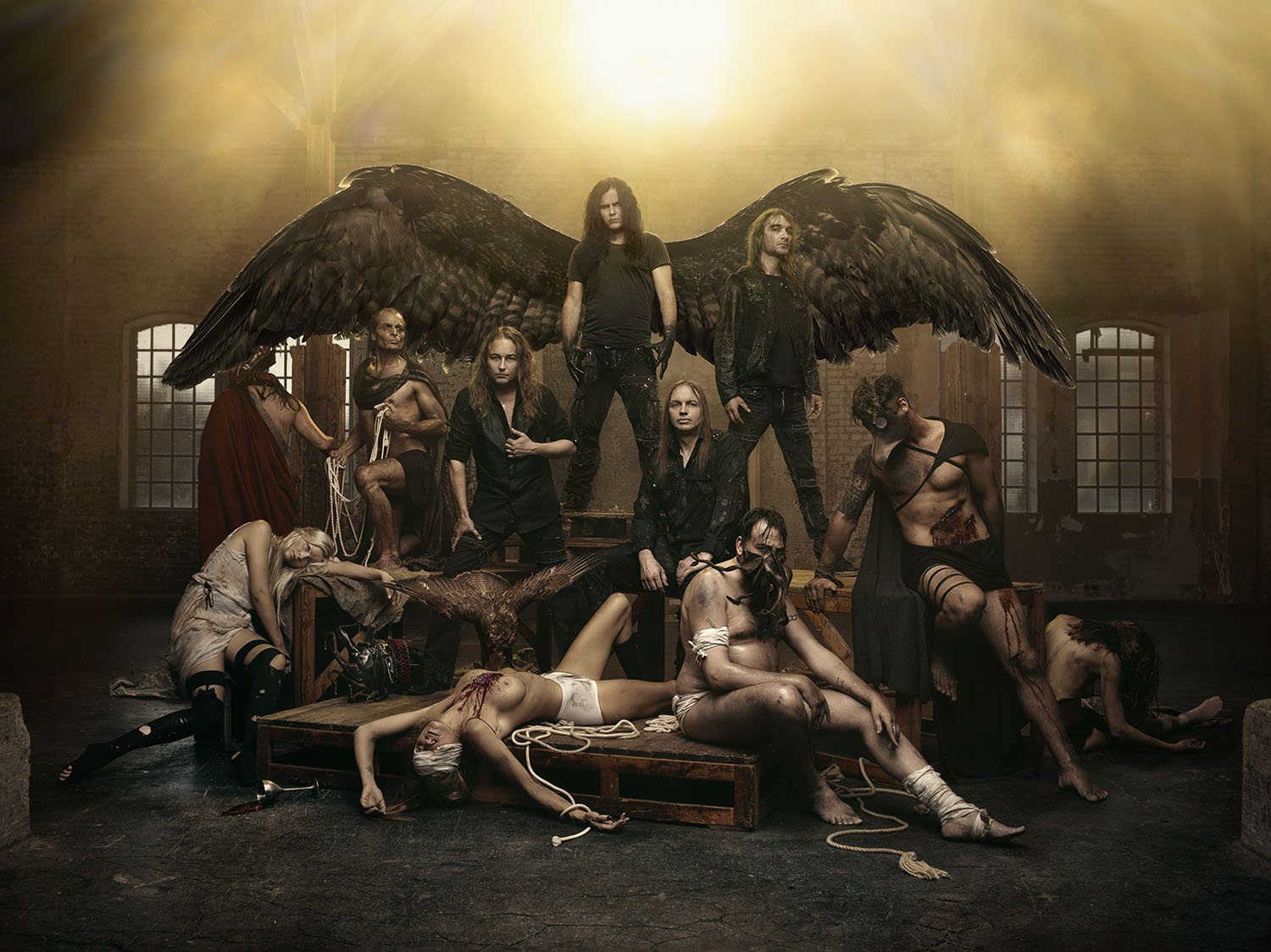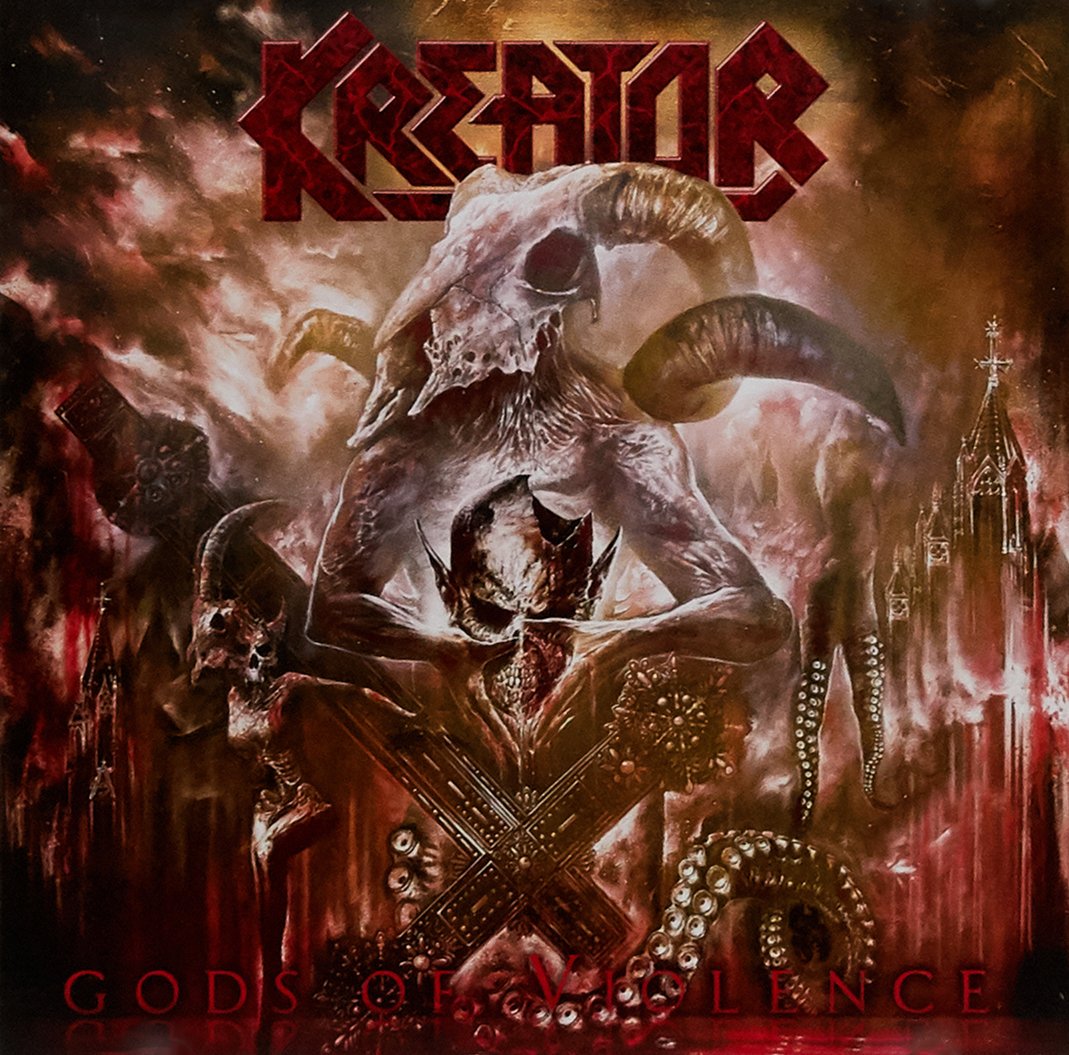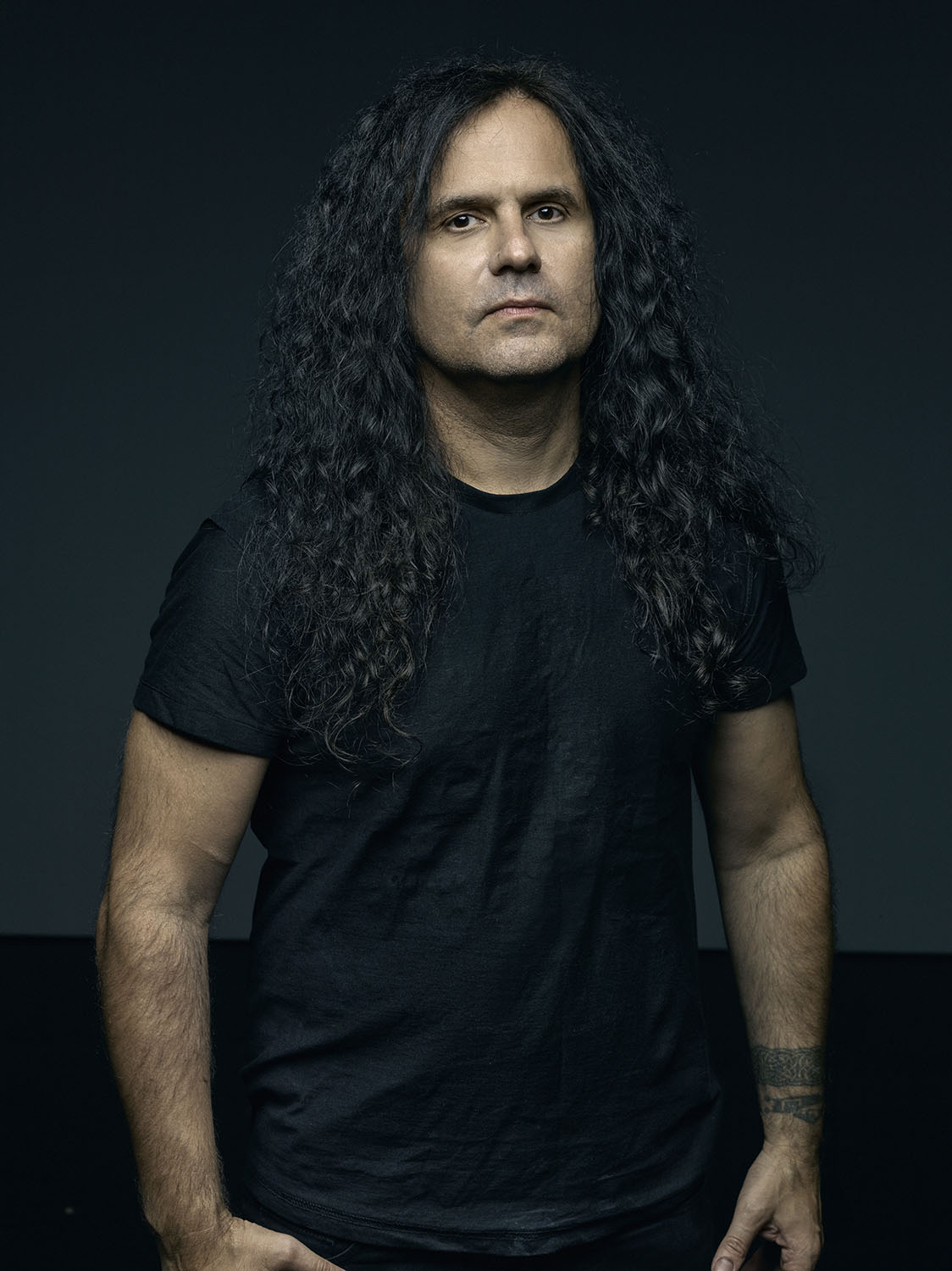One of the most respected thrash metal bands out there (and perhaps the leading one among the “Big 4” of German thrash) Kreator are truly an institution. Unapologetic in their approach to music, they’ve been rocking the stages for over 30 years.
I met with Mille Petrozza, the singer and guitar player of this band, to discuss their latest album, Gods of Violence, as well as some of the background behind the philosophy of the band.
J: What do you think is responsible for the 5 year gap between the critically acclaimed Phantom Antichrist and Gods of Violence?
Mille: Basically, the respect for the music, and the fact that we recorded an album like Phantom Antichrist. That was a really tough album to follow, so we wanted to make sure that no one would be disappointed. We also wanted to make sure that we would be able to reinvent ourselves and come out with a new version of the band and another exciting album.
J: That makes sense. Phantom Antichrist did extremely well, so I can understand that there’s some pressure to try to reach that very high bar that was left by that album. Now, when it comes to Gods of Violence, I read that the title was inspired by the terrorist attacks in Paris. Could you elaborate on that?
Mille: The title wasn’t inspired by the Bataclan massacre, actually, that was the song “World War Now.” Gods of Violence was mostly inspired by Greek mythology. If you go back to ancient Greece, the Greeks had a god for every kind human facet and character. Ares was the god of violence, and I came up with this concept where I was trying to make a connection between these ancient views of the world and the view that we have nowadays, our current reality.
What Bataclan inspired was the song “World War Now.” We have played the Bataclan club very regularly, and we love it. There has always been a nice atmosphere there, and now it will never be the same, even though we look forward to play there again. This was the first time terrorists attacked this subculture; they attacked a rock band with which, well, you or I could have been in the audience. When I saw it I thought “the war is already happening,” which is how I came up with the title. Some people think that the world needs to have a battlefield or a strategy, but this war has neither. The battlefield is planet Earth, and it could hit us any time.
J: In your album issues like religious intolerance and tyranny play an important role, as they have done in previous ones. For example, in “Satan is Real,” you reference “martyrs” who try to kill us. That rang a bell in regards to, for example, suicide terrorism.
Mille: Yeah, absolutely. “Satan is Real” is a continuation of that. When I was growing up as a kid I was imagining the world would be a better place in the year 2000, because for most of the people that I knew religion didn’t mean anything. It was something from the past, something that only their parents, or even their grandparents, would think was relevant. In the 80’s and 90’s I pictured the future as a time when religion would lose its relevance, and yet now we’re in the year 2017 and religion is stronger than ever. It’s so strong that even though not many people follow religions, the ones that do can be very extreme. “Satan is Real” talks about that, about the blind leading the blind.

J: When it comes to the role of religion now. Are we talking about Islam? Because even though in places like the United States we do see the idiocy of fundamentalist Christians, who have definitely played a role in the wars in the Middle East, the kind of violence that you reference is tied to ISIS.
Mille: That’s what they claim. We don’t know anything. I’m not an expert on these things, so I don’t want to attack any particular religion. To me all religion can be good and bad. If you follow religion for personal reasons, and it gives you strength and it helps you in your life, then there’s nothing bad about following a religion, or having faith (organized religion and simply having faith are two completely different things). Blaming one particular religion is just very easy.
J: Well, you risk taking things out of the context in which they happen.
Mille: Absolutely, because I think that Islam, in itself, if you read the Qu’ran, is a very peaceful religion. So is Christianity and, well, most religions. They are here to give you an orientation in your life and to help you start asking questions. I was raised a Catholic, and reading the Bible for the first time was almost like a fairy tale book, where people could walk on water, etc. It gave me inspiration to question things. I got into symbolism and metaphors. I’d ask the priest how come this guy could walk on water, and he’d tell me they were metaphors about the power of faith.
I think faith is very positive, and having all these symbols and ancient wisdom could be great, but we have to move on. We have to go further. We have to take it as something from the past and evolve, go further, and leave them behind.
Criticizing religion got old like 20 years ago already.
J: Well, I mean, I don’t have any faith, so I don’t care but… the cover of Gods of Violence is a crucifix sinking in a sea of blood with a burning cathedral in the background.
Mille: But I assume you have faith in yourself, right?
 J: I mean religious faith.
J: I mean religious faith.
Mille: Oh yeah, me neither. But these things are very symbolic, and they are very strong images, and I know exactly what you mean. The cover art is very dark and almost apocalyptic. It’s hard to not use these symbols nowadays; when you get in the mood for a metal album, when your audience gets in the mood for a metal album…
J: I get it, it’s a way to get a reaction.
MIlle: Exactly. It’s supposed to make you curious about the record. It’s as simple as that.
J: I understand, and it’s also nice that it maintains the style that Kreator has used for a long time.
Mille: There are bands that go the other way, of course. Metallica had just photos of themselves, which is also a cool thing, I thought it was also a cool idea.
J: I read a quote from you “My wildest years are behind me and there are a couple of things I would have sung about back in the days that just aren’t in line with my present life anymore. You can grow older and still live a metal musician‘s life for sure. But you have to make sure to preserve your dignity and to not become a parody of yourself -that‘s walking a fine line.”
What are these big philosophical things that you might have been singing years before, that you just changed your opinion about?
Mille: Oh no, I didn’t change my opinion! I only changed perspectives. I have been on this planet for a lot longer than I was when I wrote Pleasure to Kill [laughs] and it would be very sad if the 18 year old me that wrote that had the same thoughts than current version of me, even if it’s the same person. The core is the same, I still have faith in music. I think the most wonderful thing in the world to me, it opens doors, it connects people, it’s a great form of communication since everyone understands it and brings people together. I believe in music, just like when I was 18.
My perspectives have changed a little bit. This “thin line” I mentioned there can be very thin, because you have to stay a 17-18 year old musician, you have to stay the naive artist, because otherwise you become a boring artist. If you can’t put yourself into that state of mind anymore, then your art becomes tired.
J: Do you think that it has been difficult…. well, ok, first of all, I don’t think you’re old
Mille: Old-ish [laughs]
J: Old-er?
Mille: Mature! [laughs]
J: Like a fine wine
Mille: [laughs]
J: Do you think that it has been difficult to grow older in a genre like thrash metal, that has been associated with the philosophical and political elements that we associate with a rebellious youth?
Mille: Yeah, but there’s a quote from a German philosopher that says that once you stop questioning things, once you stop being curious about what is happening, that’s when you really age. I know some people who are in their 20’s, who don’t want to travel, read, or do anything! They’re old when they’re 25!
Once you lose your naive spirit, your naive self, and you no longer enjoy new bands, for example, that’s when you’re old. I’m still a big fan of young bands. Some of the bands that I like, that I’m a fan of, that are in their 20’s.
J: I think that closing yourself to new ideas is what really makes you old.
Mille: Exactly. Going like “I know everything. I’ve been there.” When I was a kid there were these bands that were from, well, before my generation. Stuff like Deep Purple, Black Sabbath, Led Zeppelin. And to me they were older people. I was listening to bands like Iron Maiden and Metallica; they were the new generation, and only later in life, in the 90’s, did I discover the beauty of, for example, Black Sabbath. That’s something that you can only experience when you mature, when you reflect different upon things.

J: Just today I was reading about the differences in the process of learning music for younger and older people. It said that even though there are some more difficulties for older people, like it might be developing the muscle memory to move your fingers along a guitar’s fretboard, it can also be more rewarding as you appreciate music differently. You play attention to the music in a completely different way.
Mille: Absolutely. It also happens with technology. I’ve always had a computer, I grew with them, but I know that younger people, people who are half my age, know way more about it and understand these things betterr than I do. At the same time I also know people of my generation that don’t even know how to work with a computer or how to use the internet. You really need to know how to communicate with these new platforms. You need to know that when you post something on the internet you’re responsible for it… since otherwise can you look very, very stupid [laughs]
J: I noticed that on Wikipedia you’re still listed as an “Anarchist Musician.”
Mille: [laughs]
J: Do you think that’s accurate? Do you consider yourself an anarchist?
Mille: I’m anti-categories. So that alone doesn’t make me an anarchist musician. Being only an anarchist musician is not how I see myself. I was really flirting with the anarchist movement, as well as with anarchist philosophy of course, but I was also interested into other forms of philosophy. Putting me in a certain category, or giving me a label as an anarchist musician, is limiting. Everything I know about anarchy, 99% I’ve learned from bands that I like. I didn’t read any of the authors… I know who they are, but everything I know about anarchism I’ve learned from Jello Biafra and Ian MacKaye.
J: Regardless of your opinion regardless Metallica’s new album, it is fairly clear that the band, for decades, don’t create “thrash metal” in the terms that Kreator does. Since you’re still playing a fairly traditional form of the genre, do you think that this has been done at the expense of more success or popularity? That staying close to this heavier sounds cuts you from a more mainstream success?
Mille: Well, in the new Metallica there is a lot of thrash metal, and I think they’re at the inventors of the genre. As for the rest, it goes back to labelling myself. Putting a label on music is also a little tough. We’re definitely more rooted in thrash metal than other bands, but I don’t see that as a limitation; I see it as an exciting challenge to put something new to this genre. I think that there are a lot of people that still enjoy this kind of music; even in the new record there is some stuff that is more “traditional metal” than thrash.
We’re a “metal band”… although we’re definitely a thrash metal band [laughs] It’s tough! [laughs]
J: Just like Metallica are part of the Big 4. What bands do you think are part of the Big 4 of Teutonic thrash?
Mille: I was never a fan of the “Big 4” thing. I love Destruction, Sodom and Tankard. They’re a huge part of our history, we’ve done many great shows with them; metal is a kind of brotherhood, so it’s easy to put a label on these bands even though if you listen to all of us, we all have a very different style. Kreator doesn’t sound anything like Sodom, they don’t sound anything like Destruction, and Tankard are very unique.
It’s a nice thought and a nice idea, but we’re 4 different bands. We’re not a unit, we’re a circle of friends, but we don’t ask for each other’s opinions when we write music! [laughs]
J: The question is whether there is enough demand to put the tour package together?
Mille: There are some plans, there have been for quite some time. The thing is, we tour a lot in Kreator. I think that Kreator and Destruction plays around the same number of shows, since they’re also very much a touring band. Sodom aren’t like that, so that’s where the problems start. We have to convince them! See if their schedule works with our schedule, etc. It’s tough to get it all going together. It’s not as easy as it seems, but we’re still working on something.
As an ads-free publication, Metal Blast relies exclusively on the support of our readers. If you enjoyed this article, please consider supporting us via Patreon, or make your shopping via one of our Amazon affiliate links.
